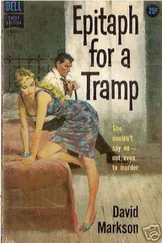James Siegel - Epitaph
Здесь есть возможность читать онлайн «James Siegel - Epitaph» весь текст электронной книги совершенно бесплатно (целиком полную версию без сокращений). В некоторых случаях можно слушать аудио, скачать через торрент в формате fb2 и присутствует краткое содержание. Жанр: Триллер, на английском языке. Описание произведения, (предисловие) а так же отзывы посетителей доступны на портале библиотеки ЛибКат.
- Название:Epitaph
- Автор:
- Жанр:
- Год:неизвестен
- ISBN:нет данных
- Рейтинг книги:4 / 5. Голосов: 1
-
Избранное:Добавить в избранное
- Отзывы:
-
Ваша оценка:
- 80
- 1
- 2
- 3
- 4
- 5
Epitaph: краткое содержание, описание и аннотация
Предлагаем к чтению аннотацию, описание, краткое содержание или предисловие (зависит от того, что написал сам автор книги «Epitaph»). Если вы не нашли необходимую информацию о книге — напишите в комментариях, мы постараемся отыскать её.
Epitaph — читать онлайн бесплатно полную книгу (весь текст) целиком
Ниже представлен текст книги, разбитый по страницам. Система сохранения места последней прочитанной страницы, позволяет с удобством читать онлайн бесплатно книгу «Epitaph», без необходимости каждый раз заново искать на чём Вы остановились. Поставьте закладку, и сможете в любой момент перейти на страницу, на которой закончили чтение.
Интервал:
Закладка:
They helped him upstairs, one stair at a time, as if he were an infant learning to walk. Mr. Brickman appointed himself cheerleader and surrogate dad.
"Whoa… that was a nice big step. A very nice step. Now let's go for another. Whoa, what a step that was. A beauty of a step. Think you can do another."
Finally they got him to the top of the stairs and then to his room. They'd added pillows to his bed to make it more comfortable, and Mr. Brickman even had a card for him.
Roses are red, violets are blue, I here your sick, get well soon. Signed Laurie.
"So," Mr. Brickman shrugged, "she's not too good with rhymes. But it's the thought that counts."
"Yes, it's a nice thought. Thank her for me."
"I already did."
Mr. Leonati said, "Look, if you want food or anything, anything at all, I'll go out for you. Till you get back on your feet."
"I appreciate that, Mr. Leonati." And he did. He appreciated everything: them helping him up the stairs, the extra pillows, even the card-he appreciated that too. Being alive-he had a little appreciation left over for that too. In fact, he'd like to give being alive his sincere appreciation. This was okay, all of it, okay. They were playing house here, him, Mr. Brickman, and Mr. Leonati, and they were all doing a bang-up job. It suddenly occurred to him that if you acted like a family, you became one, enough of one anyway, to take the chill off. And it was cold out there, colder even than he'd remembered.
But now he was back inside. And just as before, when he'd left a hospital to go back to his room, left it with a bullet lodged in his shoulder and a certain hard-won understanding of his place in the scheme of things, he felt as if an elephantine weight had been lifted from his shoulders. Atlas hadn't had such a weight. Okay-so there was a certain dignity in bearing a thing like that, even, occasionally, a thrill or two, but by and large it was just plain wearisome. When you let it go, you realized that.
But now he was back in the bosom of his little family, safely ensconced in his bed, surrounded by pillows and well-wishers. A veritable oasis of peace. The only thing, in fact, that marred this oasis of peace, marred it at all, was the box still sitting by the doorway, that box, and occasional names that came flitting into his head like a list of items he'd forgotten to pick up at the store. Mr. Waldron, Mrs. Ross, Mr. Shankin. Okay-a pretty long list maybe, but every one of them a luxury item, not part of the four basic food groups at all. You'd have to pay for those little items, they'd cost an arm and a leg-at least two ribs and a navicular bone. And he was a little strapped now, now and for the completely foreseeable future. The box would have to be thrown out. And the names? He'd forget them, the way old people always forget names-after all, names are the first to go.
He didn't, of course-though not through lack of trying. If he was graded on trying, it'd be strictly A plus. He watched a lot of television-became quite fond of television-the game shows, those talk shows, even the commercials, all of them like gabby friends absolutely intent on keeping his mind from wandering into dangerous waters. They did keep his mind from wandering into dangerous waters. Well, maybe he waded in a little here and there, strictly up-to-the-knees stuff. But then his attention would be grabbed, absolutely yanked, by Housewife Hookers or Stripper Postmen or that ever spinning Wheel of Fortune or the latest Shaq-A-Tack.
And the time television couldn't fill was taken up by Mr. Brickman, who showed up with alarming regularity as if he were pulling guard duty. In his mind, he probably was on a guard duty of sorts, for Mr. Wilson's death had turned him into a sentinel of vigilance. Not to mention a general purveyor of doom. The actual doomed here were the elderly-whom he'd elected himself guardian of in the general, and of William in the specific. In his mind, they were an endangered species, threatened on all sides by a host of evils. And William, newly back in the fold as he was, found Mr. Brickman's attitude almost pleasing, comforting even, an affirmation of his own new credo.
Mr. Brickman kept a running score of the ongoing holocaust, replete with some of the more lurid stories concerning their fellow brethren.
"An eighty-eight-year-old woman," he read to William one day, "found gagged and beaten in the closet of her Brownsville apartment. And raped."
Another day's lead story: "An elderly married couple in Washington Heights threw themselves out the window in a suicide pact. Couldn't take the constant muggings."
There were a lot of stories like those, and Mr. Brick- man found all of them. Senior citizen set on by guard dogs, elderly couple dead of dehydration, ninety-year-old poisoned by pet food, elderly people beaten, robbed, stabbed, garroted, evicted, raped, sodomized, run over, and euthanized. See, Mr. Brickman was saying, one by one the herd is being decimated.
And William listened, listened and nodded in soulful agreement. An old man's place is in bed, in bed with the television on. He understood that again; he'd be sure to remember it.
And yet he couldn't forget everything. He could forget a lot, but not everything. So there he'd be, glued to Men Who Date Canines, or listening peacefully to Mr. Brick- man recount the latest atrocity against some elderly woman, when he'd remember some other elderly woman-Mrs. Ross maybe. Tiptoeing into the room and tapping him on the shoulder like a little sister he'd been ignoring, the one whom he'd been told to look after. And even though he'd say go away, sometimes she didn't listen to him, and she'd stay there, right by his shoulder, breathing down his neck. Of course, then, more often than not, he'd remember something else-that house on Cherry Avenue for instance. He'd remember that voice telling him to come right in, and how it felt to fall into absolute nothingness. He'd listen to his old bones going ouch, and then, before you could say codeine, she'd be gone, poof, vanished. Memory, then, could be your friend. It could sometimes kick the crap out of other memories you didn't want to deal with.
One day he asked Mr. Leonati to get rid of the box, for he thought that it was deliberately staring at him. Anyway, every time he opened his eyes, it was there. Sitting there like some icon of a religion he'd lost his faith in. He wanted it thrown out. But just as Mr. Leonati was lifting it, he said no, never mind, maybe he should look through it once more and Mr. Leonati said fine, whatever, and put it back down.
But William didn't look through it. He turned on Nuns Who Strip instead. He played checkers with Mr. Brick- man. He puttered around with his two-pronged cane. He taught himself old again, not that he'd actually forgotten how. It was like falling off a bicycle-that easy.
But in the corner of the room was that box, and that box kept bothering him. There was no place in the oasis for that box. So one day he decided, really decided, to throw it out.
This time he asked Mr. Brickman to do it, and though Mr. Brickman wasn't happy about it, he agreed. He tried lifting it from several angles, like a golfer lining up a particularly difficult putt. When he finally decided on his approach, he dug in with both hands, grimaced for his audience of one, and lifted it slowly up off the carpet. And dropped it.
The box opened and almost everything came spilling out of it.
And that's how it happened, the way most things happen-not by design, but by simple, stupid accident-that William finally discovered what the numbers meant.
It was so simple, so ridiculously obvious, that for a good half minute or so he thought he must be mistaken, that it would dissolve like a thirst-induced mirage as soon as he gave it a second look.
But it didn't.
And he remembered again how there's two kinds of seeing, just like there's two kinds of reading. By rote, where every letter's letter-perfect, every word sounded out just the way Webster's tells you, but with just the most rudimentary understanding, without any real comprehension at all. And the second kind of reading, which is like reading with a third eye, like reading between the lines, where you suddenly understand everything. And William had been reading things the first way, not the second, so though he'd gone through Jean's box and made note of everything, he'd seen nothing. And he hadn't been listening either, not really. What had Weeks said? For a long while he did nothing, really nothing. That's right. He did nothing. Because he didn't read or have a television or even an interest. He didn't read. Or have a television, or an interest, or a hobby, or maybe even a friend. But he did have something. A baseball program, a little black book, two salt and pepper shakers, a couple of flyers. And a library card. He didn't read. But he had that. "Mr. Brickman," William said, "could you do me a favor and pick up that library card for me." Mr. Brickman, still smarting from his previous blunder, smiled meekly and picked up the card. "Does it have a date?" "A date?" "A date of issue?" "Oh… let's see…" Mr. Brickman peered at it. "Yep… March, of this year. Expires in 2000. Made out to-" "So it's a new card," William said, "brand-new," cutting him off, but not so much speaking to Brickman as to himself. "Yeah. It's a new card. So?" "So…?" So. So we stay in bed, so we turn on Teenagers Who Marry Their Fathers, so we bet the OTB, so we stay put. Or so we start over.
Читать дальшеИнтервал:
Закладка:
Похожие книги на «Epitaph»
Представляем Вашему вниманию похожие книги на «Epitaph» списком для выбора. Мы отобрали схожую по названию и смыслу литературу в надежде предоставить читателям больше вариантов отыскать новые, интересные, ещё непрочитанные произведения.
Обсуждение, отзывы о книге «Epitaph» и просто собственные мнения читателей. Оставьте ваши комментарии, напишите, что Вы думаете о произведении, его смысле или главных героях. Укажите что конкретно понравилось, а что нет, и почему Вы так считаете.












